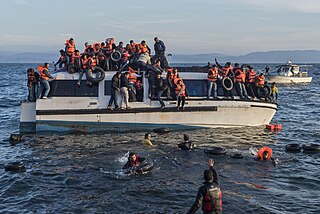
A diaspora is a population that is scattered across regions which are separate from its geographic place of origin. The word is used in reference to people who identify with a specific geographic location, but currently reside elsewhere.

A refugee, conventionally speaking, is a person who has lost the protection of their country of origin and who cannot or is unwilling to return there due to well-founded fear of persecution. Such a person may be called an asylum seeker until granted refugee status by the contracting state or the United Nations High Commissioner for Refugees (UNHCR) if they formally make a claim for asylum.

Emigration is the act of leaving a resident country or place of residence with the intent to settle elsewhere. Conversely, immigration describes the movement of people into one country from another. A migrant emigrates from their old country, and immigrates to their new country. Thus, both emigration and immigration describe migration, but from different countries' perspectives.

Human capital flight is the emigration or immigration of individuals who have received advanced training at home. The net benefits of human capital flight for the receiving country are sometimes referred to as a "brain gain" whereas the net costs for the sending country are sometimes referred to as a "brain drain". In occupations with a surplus of graduates, immigration of foreign-trained professionals can aggravate the underemployment of domestic graduates, whereas emigration from an area with a surplus of trained people leads to better opportunities for those remaining. But emigration may cause problems for the home country if the trained people are in short supply there.

Human migration is the movement of people from one place to another with intentions of settling, permanently or temporarily, at a new location.

Forced displacement is an involuntary or coerced movement of a person or people away from their home or home region. The UNHCR defines 'forced displacement' as follows: displaced "as a result of persecution, conflict, generalized violence or human rights violations".

Repatriation is the return of a thing or person to its country of origin. The term may refer to non-human entities, such as converting a foreign currency into the currency of one's own country, as well as the return military personnel to their place of origin following a war. It also applies to diplomatic envoys, international officials as well as expatriates and migrants in time of international crisis. For refugees, asylum seekers and illegal migrants, repatriation can mean either voluntary return or deportation.
Yerida is emigration by Jews from the State of Israel. Yerida is the opposite of aliyah, which is immigration by Jews to Israel. Zionists are generally critical of the act of yerida and the term is somewhat derogatory. The emigration of non-Jewish Israelis is not included in the term.

Immigration is the international movement of people to a destination country of which they are not natives or where they do not possess citizenship in order to settle as permanent residents or naturalized citizens. Commuters, tourists, and other short-term stays in a destination country do not fall under the definition of immigration or migration; seasonal labour immigration is sometimes included, however.
African immigrants in Europe are individuals residing in Europe who were born in Africa. This includes both individuals born in North Africa and Sub-Saharan Africa.
Opposition to immigration, also known as anti-immigration, has become a significant political ideology in many countries. In the modern sense, immigration refers to the entry of people from one state or territory into another state or territory in which they are not citizens. Illegal immigration occurs when people immigrate to a country without having official permission to do so. Opposition to immigration ranges from calls for various immigration reforms, to proposals to completely restrict immigration, to calls for repatriation of existing immigrants.
The economic results of migration impact the economies of both the sending and receiving countries.
International migration occurs when people cross state boundaries and stay in the host state for some minimum length of the time. Migration occurs for many reasons. Many people leave their home countries in order to look for economic opportunities in another country. Others migrate to be with family members who have migrated or because of political conditions in their countries. Education is another reason for international migration, as students pursue their studies abroad, although this migration is often temporary, with a return to the home country after the studies are completed.
Egyptian diaspora consists of citizens of Egypt abroad sharing a common culture and Egyptian Arabic language.

Emigration from Mexico is the movement of people from Mexico to other countries. The top destination by far is the United States, by a factor of over 150 to 1 compared to the second most popular destination, Canada.
Women migrant workers from developing countries engage in paid employment in countries where they are not citizens. While women have traditionally been considered companions to their husbands in the migratory process, most adult migrant women today are employed in their own right. In 2017, of the 168 million migrant workers, over 68 million were women. The increase in proportion of women migrant workers since the early twentieth century is often referred to as the "feminization of migration".

Voluntary return or voluntary repatriation is usually the return of an illegal immigrant or over-stayer, a rejected asylum seeker, a refugee or displaced person, or an unaccompanied minor; sometimes it is the emigration of a second-generation immigrant who makes an autonomous decision to return to their ethnic homeland when they are unable or unwilling to remain in the host country.

Emigration from Malta was an important demographic phenomenon throughout the nineteenth and twentieth centuries, leading to the creation of large Maltese communities in English-speaking countries abroad.
Christian Dustmann, FBA, is a German economist who currently serves as Professor of Economics at the Department of Economics of University College London. There, he also works as Director of the Centre for Research and Analysis of Migration (CReAM), which he helped found. Dustmann belongs to the world's foremost labour economists and migration scholars.
Almost half of international migrants are women, generally travelling as either migrant workers or refugees. Women migrant workers migrate from developing countries to high-income countries to engage in paid employment, typically in gendered professions such as domestic work. Because their work disproportionately takes place in private homes, they are vulnerable to exploitation and abuse. Wages earned are largely sent home to the originating country to support the cost of living of the family left behind.